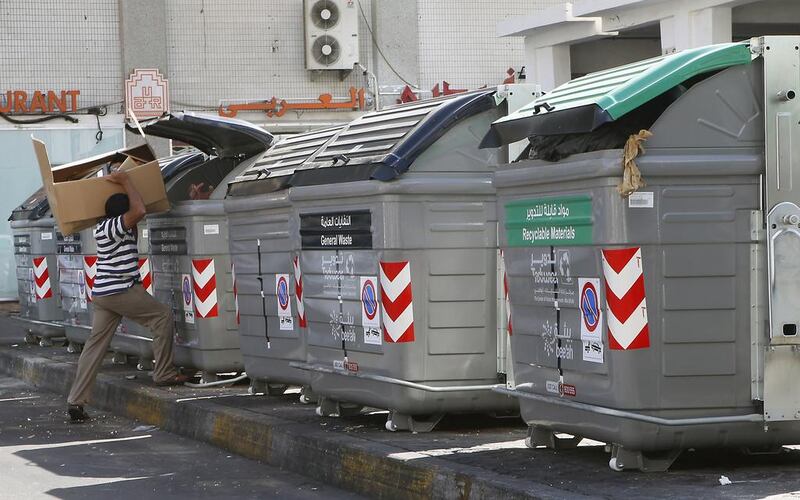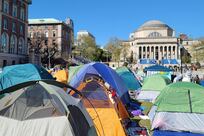ABU DHABI // Large dumpsters are to be replaced by bins for segregated waste to ensure that the target of reducing landfill by 85 per cent is met.
Tadweer, the waste management company for Abu Dhabi, said it would introduce black bins for general waste and green bins for recyclables for all residential buildings in city.
It will also send out separate bin lorries to pick up the waste, where before the rubbish was separated at the plant sites.
A spokesman for the centre said more than 19,000 waste containers had been replaced by green waste bins.
“The general waste and the recyclable materials are collected and transported separately. There are dedicated waste collection vehicles for each type of waste,” he said.
The Tadweer spokesman said there would be collections for green bins three times a week, while the black bins will be emptied every day.
Residents of apartment blocks said they would like to recycle their waste but their buildings do not have the facilities to cope with segregated waste.
Uthman Sheikh, a Pakistani resident of Al Zahiyah, said that there should be separate chutes for general and recyclable rubbish.
“Old buildings are fitted with one waste chute and residents drop everything in it,” he said.
He said the building’s cleaners then empty the waste in one large container, whether it can be recycled or not.
“New buildings should have two drop-off chutes for recyclable and non-recyclables and then job will be easier for everyone.”
Essa Abdullah, an Egyptian who lives in Khalidiya, said he would like to recycle his rubbish but his building did not have the facilities.
“People have started segregating at home and we also teach our children about green and black bins. We live in an old building so we have to dispose of our waste.”
“If all residents follow similar rules of segregating at home and dropping in the designated bins, then recycling will be easy.”
Hussain Shah, a Bangladeshi who works as a security guard in an apartment block, said: “We collect waste from the building and empty it in the black bin but if anybody discards furniture, TVs or carpets we put it separately.”
“I don’t know what’s in hundreds of the discarded plastic bags. Residents should put them separately for green bins.”
The most recent figures, from 2013, show that 12 million tonnes of waste was produced in the emirate.
The centre plans to curtail levels of waste over the next 25 years under its 2040 master plan.
“This move aligns with Abu Dhabi emirate vision towards environmental sustainability where the waste source segregation will help in achieving this target. The black bins are dedicated to the general waste and the green ones are for recyclable materials,” the spokesman said.
There are a number of recycling plants in operation in Abu Dhabi, including ones that deal with construction waste, animal corpses, plastics and tyres.
The construction plant turns waste into four different types of gravel.
The animal waste recycling plant collects dead animals from more than 11,000 farms, processing about 5,000 animals a day.
Thee tyre recycling plant processes 120 tonnes of used tyres per day. It transforms them into rubber granules.
“The number of tyres that have been collected from Al Ain city alone during the past year reached 16,600 tonnes. While plastic recycling plant has a capacity of 50 tonnes a day,” said the spokesman.
anwar@thenational.ae





